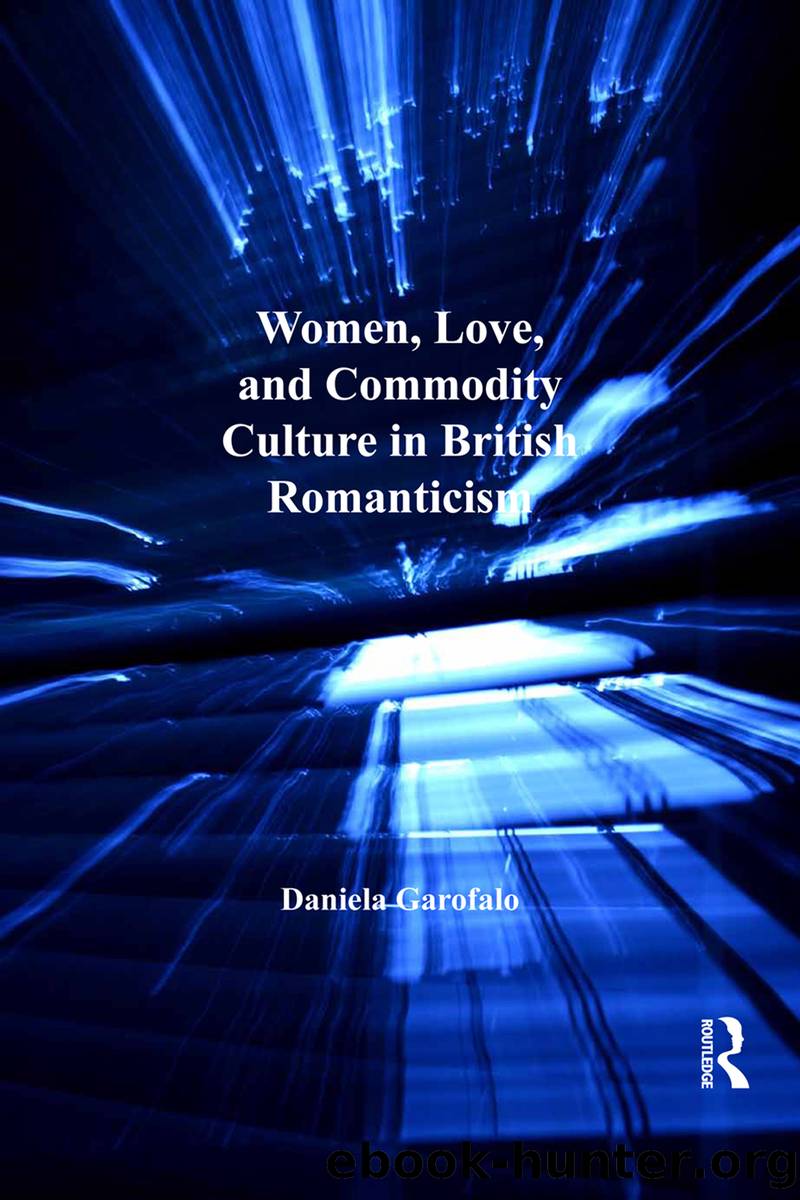Women, Love, and Commodity Culture in British Romanticism by Garofalo Daniela;

Author:Garofalo, Daniela;
Language: eng
Format: epub
Publisher: Taylor & Francis Group
Published: 2009-08-15T00:00:00+00:00
âVoluptuous Bulkâ
In the poem, the encounter with objects of desire, which seems to be merely the repetition of the same experience, leads to something new. For psychoanalysis, repetition is not repetition of the same but can lead towards a crucial difference. In the Fitz-Fulke episode, the repetition of Juanâs seduction leads to an alteration of patterns that have already begun to alter in the affair with Catherine. 25 Don Juan insistently repeats the encounter with the father. A story fundamentally about repetition, the narrative takes us to a point where repetition leads to difference. Alenka ZupanÄiÄ argues that ârepetition exists because there is no linear genesis of the subjectâ (169). Repetition is thus âclearly opposed to fantasy, which consists in filling in the gapâ and offering âa linear storyâ to account for the subject (169). Fantasy is âabout the origins (of the subject)â (169) and about a narrative that is supposed to take the subject to the end that will realize him. Instead, in Don Juan we get repetition that does not lead to a final plot resolution. Repetition essentially interrupts linear narrative in which the subject hopes to find himself and instead offers a disruption of this fantasy. The poem confronts us not with psychological depth, self-development, increasing insight into the Don and his motives, but rather with the repetition of a traumatic encounter with the father. 26 For much of the poem, the Donâs affairs have functioned as a provocation of the fatherâs regime. This repetition occurs until Juan seems poised to come into contact with the ultimate disembodied force of the father in all its supernatural power.
The ghost that haunts the abbey is said to have refused to leave the abbey when the lords of Amundeville âexpelled the friarsâ (XVI. Song st. 1) during the reign of Henry VIII. The ghost remains as a testament to the violent transfer of property from the church to King Henryâs loyal servants. As Juan learns from Lord Henry (his name recalls the sovereign who empowered his family and also his own comparative inadequacy) and Lady Adeline, the ghost appears with every subsequent transfer of property: âBy the marriage bed of their lords, âtis said/He flits on the bridal eveâ (XVI. Song st. 3), âto their bed of death/He comesâ and âWhen an heir is bornâ (XVI. Song st. 4). He recalls usurpation and violence, the deviation from the true right of possession, from the biggest father of all, a divine one, who has been dispossessed. The friar, as, Adeline sings, âstill retains his sway,/For he is yet the churchâs heir/Whoever may be the layâ (XVI. Song st. 5). The friar suggests a supernatural link between owner and property, a mystical, divine connection that makes property legitimately ownable. He also recalls that the current owners are not legitimate, that their enjoyment of property is a dispossession of the father. 27 The owners of the Abbey stand in relation to objects of enjoyment as the Don does throughout the poem. They too enjoy what does not belong to them, what has been stolen.
Download
This site does not store any files on its server. We only index and link to content provided by other sites. Please contact the content providers to delete copyright contents if any and email us, we'll remove relevant links or contents immediately.
The Power of Myth by Joseph Campbell & Bill Moyers(940)
Half Moon Bay by Jonathan Kellerman & Jesse Kellerman(921)
A Social History of the Media by Peter Burke & Peter Burke(888)
Inseparable by Emma Donoghue(856)
The Nets of Modernism: Henry James, Virginia Woolf, James Joyce, and Sigmund Freud by Maud Ellmann(773)
The Spike by Mark Humphries;(730)
A Theory of Narrative Drawing by Simon Grennan(717)
The Complete Correspondence 1928-1940 by Theodor W. Adorno & Walter Benjamin(713)
Ideology by Eagleton Terry;(666)
Bodies from the Library 3 by Tony Medawar(657)
World Philology by(650)
Culture by Terry Eagleton(649)
Farnsworth's Classical English Rhetoric by Ward Farnsworth(648)
Adam Smith by Jonathan Conlin(620)
A Reader’s Companion to J. D. Salinger’s The Catcher in the Rye by Peter Beidler(617)
Game of Thrones and Philosophy by William Irwin(604)
High Albania by M. Edith Durham(599)
Comic Genius: Portraits of Funny People by(588)
Monkey King by Wu Cheng'en(583)
